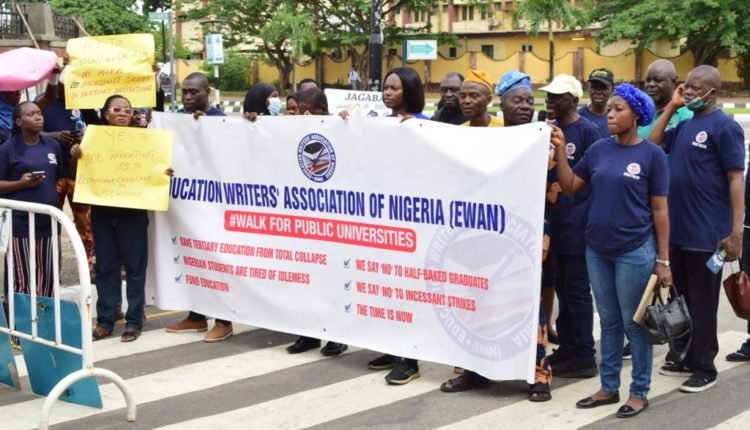Nigerian Journalists & Education Writers, Protest against Incessant ASUU Strike.
The Education Writers’ Association of Nigeria (EWAN) on Monday 25 April mobilized other stakeholders in the country’s education sector to demand “immediate reopening of Nigerian Public Universities.”
Other participants in the protest included a rights activist and former national secretary of the Committee for the Defence of Human Rights (CDHR), Jiti Ogunye; convener of Concerned the Parents and Educators (CPE) Network, Yinka Ogunde, and representatives of the National Parent-Teachers’ Association of Nigeria (NAPTAN), among others.
The association, a body of journalists across print, broadcast and online media organizations who report education in the country, said the intervention became necessary “following the nonchalant attitude of President Muhammadu Buhari-led administration to the continued shutdown of universities for almost three months.”
During the peaceful walk to the office of Lagos State Governor Babajide Sanwo-Olu, EWAN presented a list of demands contained in a letter addressed to President Buhari through the Governor.
The letter was received on behalf of the Governor by the special adviser on education, Tokunbo Wahab, while a lawmaker representing Ikeja 2 constituency, Ademola Kasumu, received another copy on behalf of the speaker of the state’s house of assembly, Mudasiru Obasa.
Speaking on behalf of EWAN, it’s chairman, Mr. Mojeed Alabi, said EWAN is greatly worried and concerned by the “large-scale rot in the nation’s education sector,” according to him both the federal government and the striking university workers have contributed significantly to the rotten system.
Members of the association in their tens carried placards with inscriptions that included “No to incessant strikes;” “Save education from total collapse;” “No to corruption on campuses,” “Fund education adequately,” “No to sexual harassment,” among other demands.
Furthermore, Mr. Alabi said universities in Nigeria, like other academic institutions, have been abandoned to suffer infrastructural decay, death of facilities, poor teacher-student ratios, poor funding, and moral academic corruption and of course largely linked largely to the politicization of the Education sector.




